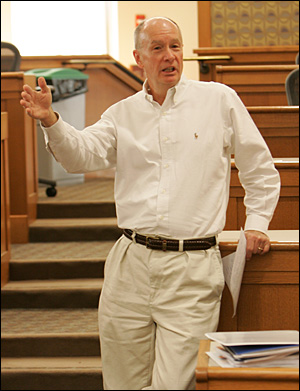|
Interview Excerpts with Dan Lankford, Venture Capitalist
Dan Lankford is managing director of Wavepoint Ventures, which funds young companies in alternative energy and other sectors. Lankford has worked for more than 30 years in the telecommunications, software, semiconductor and energy technology industries, including senior positions at AT&T/Bell Labs/Agere Systems and several early-stage companies.
How do venture capitalists differ from other investors?

Dan Lankford at the Intel/Berkely Challenge.
Photo: Bruce Cook/Lester Center
Dan Lankford: What we're looking for in the venture world, which is only one branch of the finance industry, is very large returns. Because we operate on what's called "portfolio theory." So we expect that if we have 10 deals, one of them might be a big winner, then a couple will come in okay, then a bunch more will go to zero. So if you operate that way, and that's basically the financial model for all venture capital, you don't want to go into a deal unless you see the potential for very big returns, like 10-times on your money. If you select your deals carefully, portfolio theory generally works out to have a reasonable rate of return. But in order to do that, the first thing you have to have is a sustainable differential advantage. Because if you have a really good thing, other people are going to come in and do it and then you don't get outlandish returns.
How does a young company benefit from getting a deal with a venture capital (VC) firm?
Lankford: The typical response from people who are not a part of the industry is the VC brings money. The VC of course brings money, but the VCs that are good bring more value in non-monetary contribution. Let's start with the team. Every team will have a few key spots that need to be filled. We have networks of people that we bring in. We also have networks of service providers - lawyers and head hunters for example. We're like guides, and we guide the entrepreneur. Any venture capitalist worth their salt brings non-monetary industry knowledge, technology skills, as well as team-building.
Is investment in alternative technology off the charts these days?
Lankford: Absolutely, but I have to give you the caveat. I've been around long enough to have seen it go off the charts before. One of the historic problems we have seen in what we sometimes call "clean tech" energy has been driven by a lot of factors and not all are based in the real market. For example, the solar energy business has been cyclical based on government subsidies. That's distorted market forces. I think the difference this time is that the underlying economics are, over the long term, moving in the right direction for investment and probably in the right direction for global warming because what it ultimately does is drive us away from a carbon-based economy. Think about the world. What's the hottest selling thing in cars today? Hybrids. My wife just bought a hybrid. And why did she buy a hybrid? It's not exactly a good economic deal. But it is an interesting hedge against your fear of rising fuel prices and in a way also addresses concern for global warming.
Is there a strong mood among investors that the facts are in and we have to reduce our carbon emissions?
Lankford: There's no question about it at all. One of the more interesting deals I looked at recently is a deal in carbon-trading platforms. And we've done a lot of looking in this space. In the United States, we have a very different view of that because we're not signatories to the Kyoto Treaty. But multinational corporations are already in many cases generating and trading carbon credits. Because the rest of the world is in the mode of looking at carbon caps, the cap and trade system is growing at an unbelievable rate right now.
|

